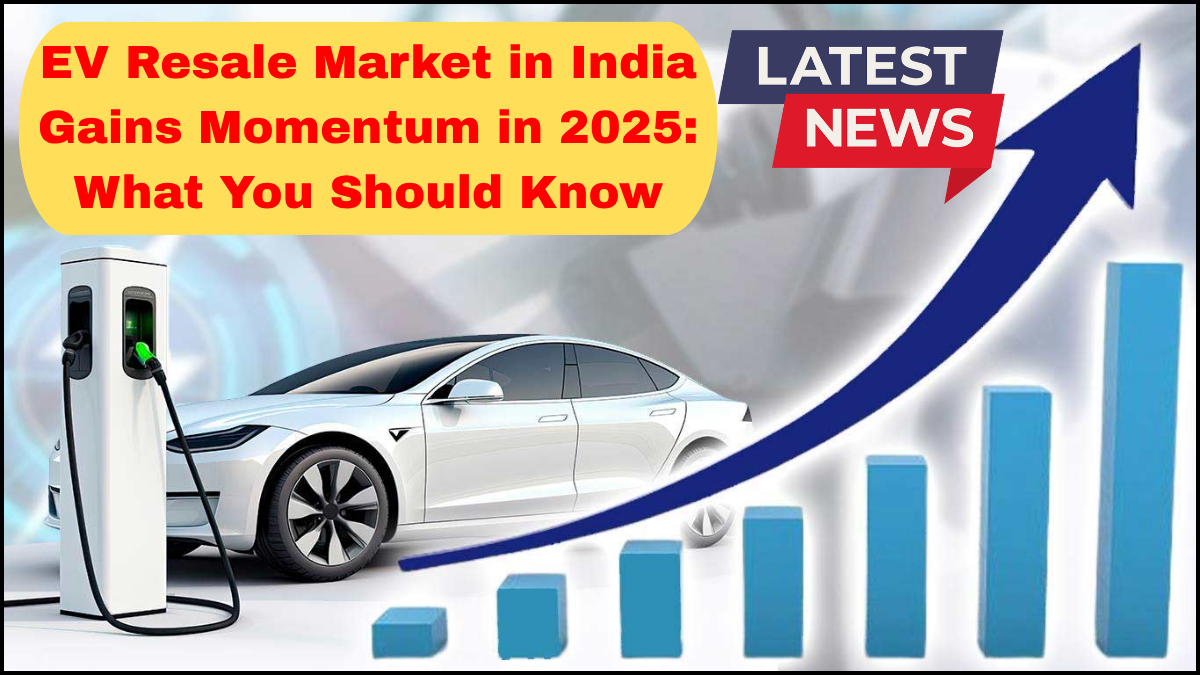India’s electric vehicle (EV) revolution isn’t just limited to new car sales anymore. In 2025, a new trend is taking shape — the EV resale market in India is gaining serious traction. As more Indians adopt EVs, the secondary market is evolving from a niche space into a robust segment with real investment potential. Here’s a deep dive into what’s changing, why it matters, and what buyers and sellers should keep in mind.

Why the EV Resale Market in India Is Growing in 2025
A few years ago, resale of electric vehicles was practically nonexistent. Concerns about battery degradation, lack of awareness, and weak resale infrastructure kept the market stagnant. Fast forward to 2025, and several factors are changing the game:
-
Increased EV Adoption: With EV sales hitting record highs in urban and semi-urban areas, the first wave of EV buyers is now ready to upgrade or switch.
-
Improved Battery Tech: Advances in lithium-ion and solid-state batteries mean that used EVs retain more range and value over time.
-
Wider Service Network: Manufacturers like Tata, Mahindra, and BYD are expanding service centers, making it easier to maintain older EVs.
-
Policy Push: Incentives for EV ownership and scrappage policies for ICE vehicles have driven demand in the used EV segment.
EV Resale Value in India: What Affects It?
Understanding EV resale value in India means considering multiple factors that differ from internal combustion engine (ICE) vehicles.
1. Battery Health and Warranty
Battery health is the cornerstone of EV value. A used EV with a battery above 80% capacity and an active manufacturer warranty commands significantly higher resale prices.
2. Brand Reputation and Model Demand
Cars like the Tata Nexon EV and MG ZS EV are leading the used EV charts due to their strong brand trust and high resale inquiries.
3. Mileage and Charging History
Unlike petrol or diesel vehicles, how an EV was charged matters. Frequent use of DC fast chargers can slightly degrade battery life faster, impacting value.
4. Software and Connectivity Features
As EVs are essentially smart vehicles, buyers look for OTA (over-the-air) software update compatibility, driving behavior tracking, and app integration features.
What Sellers Should Know
If you’re planning to sell your electric vehicle in 2025, there are several steps you can take to boost its resale value:
-
Get a Certified Battery Health Report: Just like a car history report, a battery health certificate builds buyer confidence.
-
Service Records Matter: Ensure all routine maintenance is documented, especially services related to the battery and drivetrain.
-
Clean Transfer of Ownership: EVs are digitally connected. Make sure all ownership and app-linked services are transferred to the buyer properly.
Used Electric Vehicle Tips for Buyers in 2025
If you’re entering the second-hand EV market, keep these used electric vehicle tips in mind:
1. Check Battery Life, Not Just Mileage
Don’t judge an EV by its odometer alone. A 3-year-old car with a well-maintained battery can be a far better deal than a newer model with improper charging habits.
2. Ask About Charging Habits
Understand whether the previous owner mostly used home charging or fast chargers. This can indicate how the battery was treated.
3. Look for EV-Specific Inspection
Regular car mechanics may not be qualified to evaluate EVs. Choose certified EV garages or manufacturer-authorized centers for a pre-purchase inspection.
4. Factor in Charging Infrastructure
Ensure your locality has convenient charging options. Used EVs may not support the latest charging speeds, so plan accordingly.
Challenges Still Facing the EV Resale Market
While momentum is building, some challenges remain:
-
Pricing Benchmarks Are Still Evolving: Unlike ICE vehicles, there isn’t yet a consistent pricing guide for used EVs.
-
Financing Gaps: Many banks still don’t offer used EV loans or provide lower loan-to-value ratios, limiting affordability for some buyers.
-
Low Rural Penetration: EV resale is still largely urban-centric due to charging infrastructure and awareness gaps.
Future Outlook
The trajectory looks promising. As India targets 30% EV penetration by 2030, the resale market will naturally expand. Platforms like OLX Autos, Cars24, and manufacturer-backed programs are already piloting EV resale value in India assessments and resale guarantees. By 2026, expect standardized battery grading, better financing options, and extended warranties to make used EVs more attractive than ever.
FAQs
Q1. Are used electric vehicles reliable in India?
Yes, especially models from trusted brands with good service history and battery health reports. Reliability also depends on how the car was charged and maintained.
Q2. How is EV resale value in India calculated?
It depends on battery health, age of the vehicle, warranty status, mileage, and brand reputation. Battery condition holds the most weight in resale pricing.
Q3. What are some used electric vehicle tips for first-time buyers?
Check battery health, ensure the car supports local charging infrastructure, get a professional EV inspection, and verify that the software features are up to date.
Q4. Can I get a loan for a used EV in India?
While not as widespread as ICE loans, some banks and NBFCs have started offering used EV financing. Expect lower LTV and shorter tenures compared to new EVs.
Q5. Is it better to buy a new EV or a used one in 2025?
It depends on your budget and needs. If you can verify the battery and software health, a used EV can offer excellent value, especially with lower running costs.
click here to learn more
